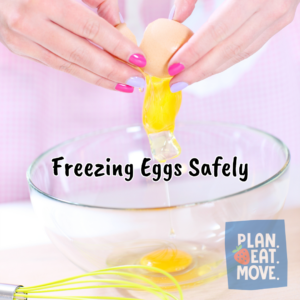
With the ever-changing price of eggs, many people are buying in bulk and looking for ways to preserve them. While you cannot freeze eggs in the shell – they will crack ― there are ways to safely freeze eggs. Follow these simple steps for the best quality.
For whole eggs, crack into a bowl and gently mix. Don’t whip in air because this will lead to decreased quality over time in the freezer. To prevent graininess and gelling of the yolks, add 1½ tablespoons sugar or corn syrup per cup of eggs if you will use the eggs in sweet dishes or ½ teaspoon salt per cup of eggs if you will use the eggs in savory dishes. Strain through a sieve (for best texture) and pour into a freezer-safe container leaving ½-inch space at the top for expansion. Freezer bags work great with eggs because they lay flat and take up very little space. Next, label and date the container.
For egg whites, crack and separate into a bowl. Gently mix, taking care not to whip in air. Strain through a sieve. No sugar or salt is needed. Pour into a freezer bag, leaving ½-inch space at the top. Label and date.
For egg yolks, crack and separate into a bowl. Gently mix without whipping in air. Add 1½ tablespoons sugar or corn syrup per cup of yolks if you will use them in sweet dishes or ½ teaspoon salt per cup of yolks if you will use them in savory dishes. Strain through a sieve and pour into a freezer bag, leaving ½-inch space at the top. Label and date.
Thaw eggs in the refrigerator overnight and use the conversions below when you’re ready to cook. For best results, use frozen eggs within one year.
3 tablespoons eggs = 1 whole egg
2 tablespoons egg whites = 1 large egg white
1 tablespoon egg yolk = 1 large egg yolk
Reference:https://nchfp.uga.edu/how/freeze/eggs.html
Source: Annhall Norris, Food Preservation and Food Safety Extension Specialist
